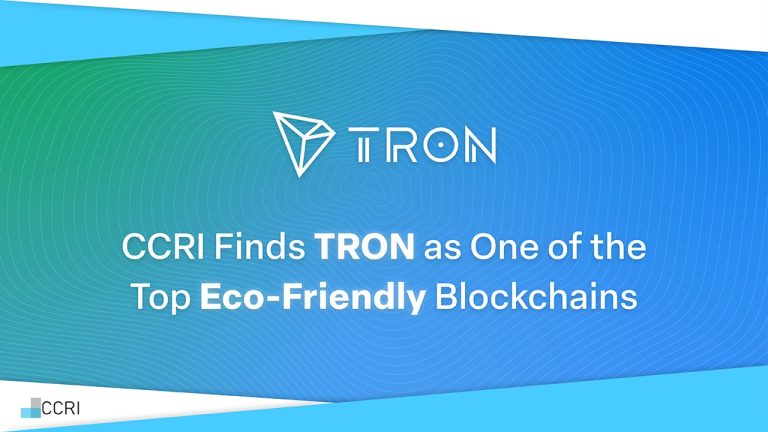
A new report by the Crypto Carbon Ratings Institute (CCRI) showcases the environmental sustainability of the TRON network. According to the “Energy Efficiency and Carbon Footprint of the TRON Blockchain” report, the highly popular TRON network only consumes as much electricity as just fifteen average U.S. households.
The Environmental Sustainability of the TRON Network
The electricity consumption and related carbon footprint of Bitcoin and other cryptocurrencies have been subject to extensive discussion in public, academia, and industry. Various estimations exist, comparing Bitcoin and other cryptocurrencies’ electricity consumption to various mid-sized countries. The problem has been known for several years, and other systems and technologies have emerged to try and solve the issue.
The consensus mechanism of Proof of Stake (PoS) is deemed superior regarding the electricity requirements compared to the traditional Proof of Work (PoW) consensus mechanisms. While it is consensus in the broader scientific community that PoS does not exhibit the same electricity issues as PoW, individual PoS systems’ responsibility is typically less clear.
Due to the nature of the software engineering process and network architectures, different PoS systems rely on varying fundamentals regarding the hardware requirements, programming language, network size, transaction throughput, transaction complexity, and more. These factors influence the electricity consumption and, therefore, the carbon footprint of a respective network.
Since an extensive analysis of the electricity consumption and carbon footprint was not available for the cryptocurrency TRON, the report aimed to provide insights into, examine and include the electricity consumption, carbon footprint, and influencing factors of the TRON Proof of Stake blockchain network.
According to the investigation, the report can state that the TRON network has 367 nodes, 2.317bn transactions per year, the total yearly electricity consumption is 162,867.85 kWh, electricity per node is 443.78 kWh/year, electricity per transaction is 0.07 Wh, and total carbon emissions are 69.47/year. The results were extrapolated based on the assumption of the number of transactions occurring during the measurement period in one day to a yearly transaction count needed to contextualize the electricity consumption.
Based on the methodology used, outlined in the report as four steps to reach a result, the report can conclude that the TRON network is an environmentally sustainable network system. In the report, an approach is outlined for calculating the TRON network’s electricity consumption and carbon footprint. Then, the investigation team selected the appropriate hardware, made measurements of the protocol, and calculated respective metrics, including key ones like using the Bitcoin and Ethereum networks for comparison.
As stated before, the team estimated the yearly electricity consumption of the Proof of Stake network to be 162 867.85 kWh; this results in a carbon footprint of 69.47 tonnes of CO2e annually. Compared to other electricity consumers, such as an average US household, the network consumes roughly only 15 times more electricity and produces 11 times the amount of an intercontinental round-trip flight.
Overall, the emissions of the network are very low, especially compared to the other PoS networks like Avalanche, Algorand, Cardano and Solana.
TRON’s Unique Delegated Proof of Stake System
Decentralization is built from the ground up. The core vision of TRON is to decentralize the internet, and TRON’s strong foundation has led to a successful process started from the grassroots that lets TRON operate per that vision. Decentralized protocol governance is achieved at a foundational level through the decentralization of consensus. Several different types of consensus mechanisms are available for blockchains, each with its advantages and disadvantages.
Instead of a traditional PoS consensus mechanism, TRON uses delegated proof-of-stake (DPoS) to achieve decentralization better. Unlike PoS, DPoS increases the power of the community to elect nodes to approve blocks of transactions. Just as building on a blockchain doesn’t create decentralization by default, DPoS doesn’t automatically create a strong foundation for a decentralized system.
In the TRON ecosystem, the community elects 27 block validators to serve as “super representatives” (SR) every six hours for this vital task. These SRs are openly voted and chosen by the community of users staking their TRX, TRON’s native token, in the blockchain system. Regardless of the size of TRX staked, each SR can cast only one vote, which effectively grants it only 3.7% of the actual voting power.
By eliminating governance power based on assets staked, TRON has created an even distribution of governance power that avoids centralized control. As a result, TRON’s adaptation to DPoS has created a stronger foundation for decentralization than other PoS blockchains.
Like any blockchain network, TRON’s network is also composed of distributed nodes, which form the core of the network’s infrastructure. They are essential to decentralization, and TRON’s nodes are energy efficient. According to the report, marginal electricity consumption per transaction of a single node is 0.0007245 Ws. The team utilized Carbon Footprint’s location-specific emission factors to calculate the average carbon intensity of the country in which a TRON node is located. Based on the emissions calculated for the TRON network, the report states that one may conclude that this DPoS-based blockchain protocol consumes an amount of electricity that does not even justify the discussions about their environmental impact at current levels and that TRON is an environmentally conscious and sustainable blockchain network.
To learn more about the TRON network check the latest developments on TRON.Network, Telegram, Discord, Reddit, GitHub, and Twitter.
This is a sponsored post. Learn how to reach our audience here. Read disclaimer below.
from Bitcoin News https://ift.tt/AL0D2hz
Comments
Post a Comment